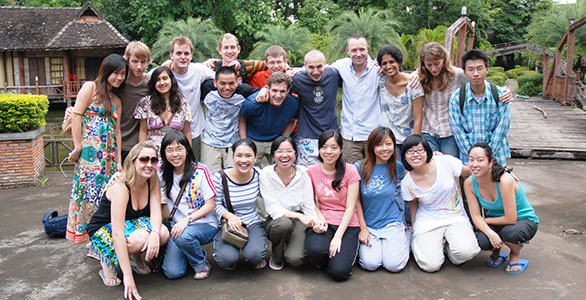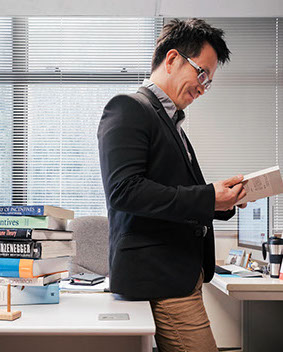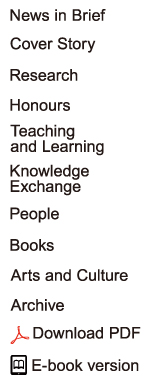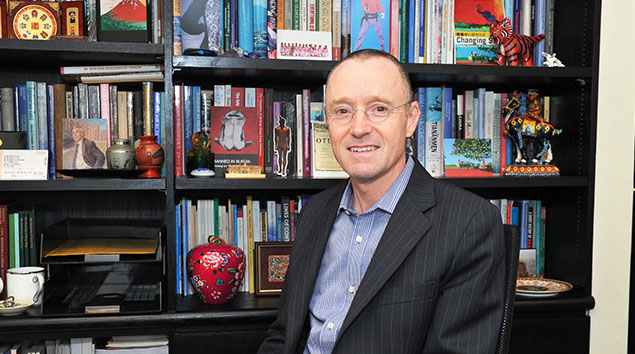Online, Off-Campus, Engaged
Learning at HKU is expanding into new domains, led by the new Vice-President and Pro-Vice-Chancellor for Teaching and Learning, Professor Ian Holliday.
As the first in his family to attend university – a family that had hardly any books at home – Professor Ian Holliday is well experienced in ploughing new ground. He will need that pioneering spirit in his new role as the Vice-President and Pro-Vice-Chancellor for Teaching and Learning at HKU.
The University has not yet completed the first cycle of its new four-year undergraduate curriculum, which will happen when the first cohort graduates next year. But already Professor Holliday is being tasked with pushing the curriculum envelope in new directions.
Technology and globalisation are impacting higher education in ways that were barely imaginable 10 years ago, when the current curriculum reform began. Professor Holliday’s job will be to pin down these fast-moving targets to benefit students.
![]() We can’t afford to fall behind our students so we have to meet them where they are, and often that is on the internet.
We can’t afford to fall behind our students so we have to meet them where they are, and often that is on the internet. ![]()
Professor Ian Holliday
“For me, there are three big items on the agenda. The first one is e-learning, which involves MOOCs [massive open online courses], Wi-Fi enabled classrooms and just about anything that makes the lives of our students as technology-enabled as possible. We can’t afford to fall behind our students so we have to meet them where they are, and often that is on the internet.
“Second is our commitment to open up quality opportunities for 50 per cent of all undergraduates to have one Mainland China learning experience and one international learning experience by 2019, and 100 per cent by 2022. That is not so far away and we have included it in our academic development proposal that we recently submitted to the Government.
“And third is that I will be doing what I can to animate the campus culture for teaching and learning. We already have a great platform to build on with the new campus and the residential colleges and halls. I’m keen to find out what students want to do and let them run with that. Their entire experience at HKU can be an opportunity for teaching and learning.”

Professor Holliday (fourth from right in the second row) with students in the Migrant Outreach Education Initiative programme teaching English in Mae Sot, Northern Thailand.
Drawing on experience
To accomplish all this, he will be building on the achievements of his predecessor Professor Amy Tsui, who was widely praised for developing the four-year curriculum and introducing innovations such as the Common Core. Supporting him will be a team that includes the new Associate Vice-President for Teaching and Learning, Professor Ricky Wong (see box), the Centre of Development and Resources for Students, the Gallant Ho Experiential Learning Centre, the Centre for the Enhancement of Teaching and Learning, the Academic Advising Office, and the Associate Deans for teaching and learning in each Faculty.
Professor Holliday will also draw on his own experience as Dean of Social Sciences from 2006 to 2011, when he introduced a new requirement for undergraduates to pursue off-campus learning related to social innovation and global citizenship goals. He supported these goals by founding the Migrant Outreach Education Initiative (MOEI) programme in which students teach English in Myanmar, Cambodia and Thailand.
As Dean, he also kept his door open to students – something that now requires a little more effort given the corporate layout of HKU’s senior management offices. He is therefore meeting students on their turf by staying involved with MOEI, continuing to co-teach a Common Core course on humanitarian intervention and seeking opportunities to meet with students on campus. He also chairs the management committee of the four residential colleges. “It’s a question of having good dialogue channels with students and being open to them. I will be out and about as much as possible,” he said.
A whole new learning world
Learning in the 21st century is unlike anything we have seen before, with technology demolishing walls and barriers and offering new ways to connect teachers and learners. The changes have been rapid and are still underway. To ensure HKU stays ahead of the game, a new Associate Vice-President for Teaching and Learning has been appointed to deal specifically with e-learning.
Professor Ricky Kwok of the Department of Electrical and Electronic Engineering has a background in computer science, steered curriculum reform within his department, and has been conducting research on learning analytics.
He will now be consolidating and advancing e-learning across the University as a whole – encompassing everything from MOOCs to SPOCs (small private online courses) to flipped classrooms (where students do homework before class using online and other sources) to blended learning (combining online and face-to-face learning). He will also investigate how to improve the supporting infrastructure on campus, such as Moodle and Panopto, and promote e-learning among his colleagues at HKU and other institutions.
“I believe learning is e-learning. Students come to us with a new way to learn and teachers need to respond with a new way to teach,” he said.

Next



